Ohio State Students Reflect on Moving Subjects Week
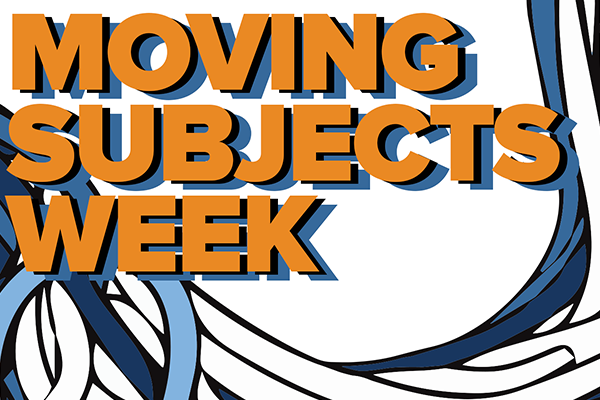
From October 14-19 2019, the Migration, Mobility and Immobility Project hosted “Moving Subjects,” a week-long series of events that engaged these three concepts from a comparative and interdisciplinary perspective. Here, we publish a number of reflections of Ohio State students who participated in the events and shared their thoughts in the aftermath.
Four Women: The Diasporic Art of Josette Bushell-Mingo
October 15, 2019 | A musical and conversational evening with renowned Afro-British/Swedish artist, activist and cultural advocate Josette Bushell-Mingo, tracing her personal and professional journey as a black stage and film actor, director and vocalist in contemporary Europe. In addition to a public discussion of her diasporic life and work, the event featured select performances from Bushell-Mingo’s solo stage play, Nina: A Story About Me and Nina Simone.
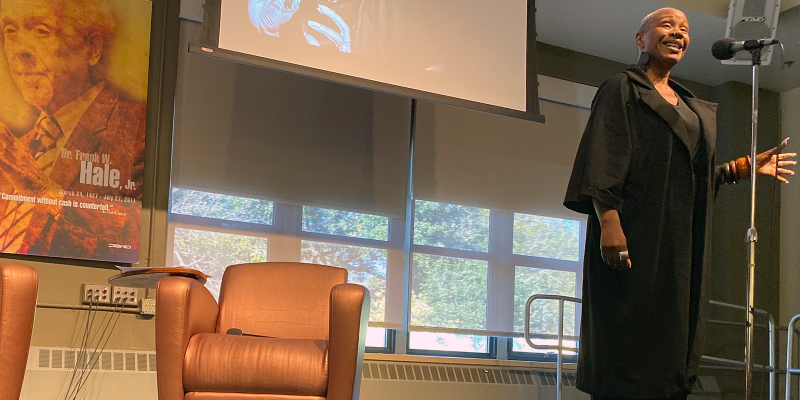
Hailing from Dallas, Texas, Ammar Ansari is a senior psychology major with plans to attend law school following graduation.
The event that I chose was the performance and talk by the incredible Josette Bushell-Mingo. I learned much about the perspective of a minority artist in a largely homogeneous nation such as Sweden. The testimony she shared about her experience as the sole person of African descent in a classroom environment wherein the professor used the n-word to elicit an emotional response from the class, and her subsequent response to this professor, was incredibly powerful yet eloquent. In terms of the themes of migration and mobility, a short clip from a film she starred in, “Medan vi Lever,” illustrated some of the feelings immigrants in western nations felt. In the film, she plays a migrant from Gambia who, after living in Sweden for many years, decides to return to her mother country due to the many micro-racisms she experienced. Her character spoke of how even after learning the language and “assimilating”, she would never be a “blonde, blue-eyed Swede.” She also shed light on some of the nationalist sentiment that I was unaware of currently occurring in Europe, specifically in Scandinavia. When she spoke of the white supremacist riots that occurred days before her show premiered in Finland, in which people chanted, “Close the borders, open the ovens,” the terror she and her castmates collectively felt was palpable. Similarly, the power over the room she wielded during her reading of the final act of her Nina Simone play, in which she brandishes a gun and implores the audience to give her any reason not to use it on them, before engaging in an improvised back and forth with the audience was incredible. Her stage presence, manner of speaking and the way she commanded the room with both her words and her songs were awe inspiring and thought-provoking, and it was truly a privilege to be able to hear her thoughts and performances.
Robert Dyehouse is a third-year undergraduate student from Cincinnati majoring in history with a minor in Japanese.
Josette Bushell-Mingo’s talk on her work Four Women, which delves into the daily struggles with racism faced by people of African descent, was illuminating and insightful. To Bushell-Mingo, racism has become quotidian, prosaic; it is entrenched in Western society. Four Womenis her effort to elucidate this reality and educate white people about the centuries of racial violence they have perpetrated. Kandia, one of her four women, is a fictional character whom she acts in the film While We Live. Born and raised in Africa and later moving to Sweden, Kandia becomes fed up with the omnipresent, inextricable racism in Europe and vows to return to Africa. Another of her women is Nina Simone, an African-American singer and civil rights activist. Bushell-Mingo explained that portraying Simone on stage allows her to channel the rage and vindictiveness that racism sparks. She described an act in which she pretends to hold a gun and entreats audience members, almost all of whom are white, to give her a reason not to shoot them. This performance is a manifestation of her bitter enmity towards the legacy of slavery and racism and its devastating emotional impact. Simone and Kandia accentuate the underlying racism that proliferated in the postcolonial era as migrants flocked to their erstwhile conquerors in search of economic stability and a new life.
Bushell-Mingo’s talk made me consider Western/white racism within a European postcolonial context. To me, the racism precipitated by slavery in the United States was axiomatic, but I had never pondered the rampant racism of postcolonial Europe. As a smaller minority, African immigrants might have been more marginalized and seen as even more of an “other” than their African-American counterparts. Nevertheless, Bushell-Mingo is one of the most accomplished women in Swedish theatre. She established the National Black Theatre of Sweden, the founding of which she characterized as “nothing unusual,” and “part of a journey.” It was inspiring to learn about Bushell-Mingo’s achievements in theatre and cinema despite the myriad obstacles to her success posed by racism. She truly embodies her own definition of blackness: “struggle and triumph."
Graduate Student Research and Creative Activity Forum and Reception
October 16, 2019 | This poster presentation featured the work of graduate students who are the recipients of the Migration, Mobility and Immobility Project’s Research and Creative Activity Grants.
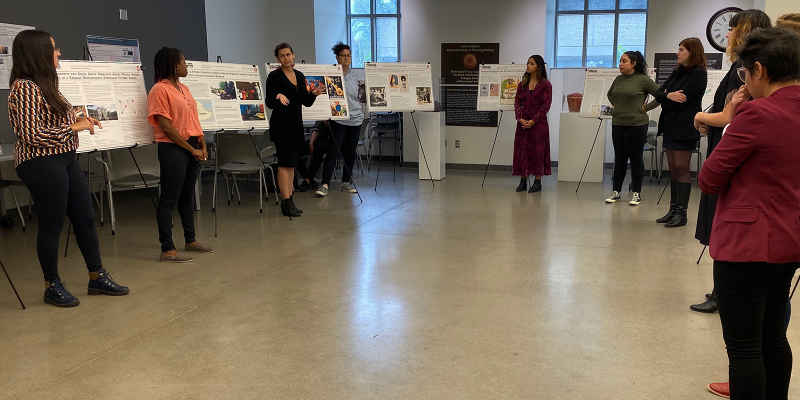
Brendan Burke is a second-year student double majoring in economics at the Fisher College of Business and history in the College of Arts and Sciences. He is from the suburbs of Cleveland, Ohio. Outside of school, Brendan is passionate about writing, music production and playing guitar with his band RedShift.
During Moving Subjects Week at Ohio State, I was able to attend a Graduate Research Expo where graduate-level humanities students presented on and discussed field research projects they had performed in areas relevant to the idea of migration and mobility. I was particularly impressed with the extensive breadth of fields of study and topics included: the expo went far beyond “conventional” humanities fields such as history and literature and included a variety of research projects in the disciplines of sexuality and gender studies, Slavic language and culture, dance and ethnomusicology. The projects displayed delved into what I saw as significantly underrepresented topics such as Japanese expatriate communities in South America, an ethnic group of isolated Afro-Brazilians that had developed their own unique dialect, the experiences of Central Asian immigrants in Moscow, and the link between the customary musical styles of Mexican and Appalachian communities. Such a diverse range of research demonstrated to me how interdisciplinary and nonbinary the subject of migration and mobility is. I learned that to gain a more complete understanding of the struggles and experiences of migrants, refugees and other movers, it is important to examine and study disciplines and topics that may not seem immediately connected to the issue. Clearly, with such an impressive lineup of graduate-level researchers, The Ohio State University values this multidimensional approach to studying mobility. Through the presentation of this research, both Ohio State academics and the public at large are better equipped to solve relevant, modern problems related to migration and mobility and provide better assistance to any moving subjects who require it.
Keynote Address: Becca Heller, "Refugee Rights at a Crossroads"
Becca Heller is the co-founder and executive director of the International Refugee Assistance Project, which provides legal advocacy for refugees and displaced people through free direct legal representation, advocacy and litigation. In recognition of these efforts, the MacArthur Foundation named Heller a 2018 Genius Award Recipient for her work “to defend the rights of refugees and improve protection outcomes for many of the world’s most at-risk populations.” In this keynote address, Heller discussed her personal experiences and the work IRAP has done to explain how and why refugees and migrants seek safety in third countries, what processes and legal norms are available to them and how perceptions of “crisis” are being politicized to keep people out. Engaging the dominant narratives about who refugees are, this talk provided a vision for how to confront rising xenophobia around the world by providing pathways to safety for vulnerable people. Watch video of keynote address.
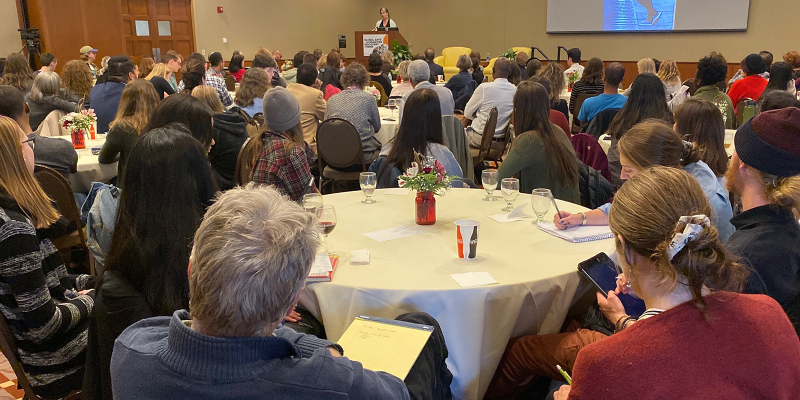
A native of Toledo, Ohio, Erica Alford is a senior at The Ohio State University, majoring in history. Following her spring 2020 graduation, she plans to pursue her master’s degree in library and information sciences.
In the keynote address of Moving Subjects Week, Becca Heller focused primarily on her work as the co-founder and director of the International Refugee Assistance Project (IRAP). She discussed how the United States has trended toward accepting fewer and fewer refugees annually, dropping to roughly 18,000 in 2018. This substantial downtrend can be attributed to the Muslim Ban put into effect by the Trump administration. Through IRAP, Heller and her fellow refugee rights activists coordinate assistance for displaced persons affected by the “U.S.-created refugee crisis in Iraq,” as she called it. Heller also addressed the fact that the United States should want to accept refugees, as studies (including one conducted by the Trump Administration) have shown that immigrants are huge economic contributors, and we suffer economically without them.
In her talk, Heller stated that the International Refugee Assistance Project began as a student organization. She addressed the students in the audience, stating that although the issues facing people today may seem big, small acts can end up having a significant impact. In addition to student advocacy, Heller suggested volunteer work, writing op-eds and simply voting as means by which people can advocate for refugee rights. In discussing these options, she also brought up reasons for advocates to continue to have hope for the future and battle the exhaustion that comes with advocacy work. Her biggest sources of hope for the future are the times she has witnessed “popular rage” at the Trump administration’s mistreatment of refugees — such as the “Let Them In” chants at airports across the U.S. when the Muslim Ban was put into effect — and the protests that took place in response to the Trump administration’s policy of family separation at the U.S.-Mexico border.
Becca Heller’s keynote address was moving for those in the audience like myself who share her compassion for our fellow humans, regardless of their country of origin. Her passion, bravery and honesty were revitalizing, and she had the whole room laughing on more than one occasion. Her work is a constant reminder that although it is an uphill battle, there are people out there putting in the work to help secure a better future for victims of tyranny and corruption. Her example can be and has been followed by other student organizations across the country, and the work of professionals in the humanities, both at The Ohio State University and elsewhere, are integral to the work these organizations do.
A native of Cincinnati, Abi is a third-year student at Ohio State majoring in political science. Her undergraduate history thesis focuses on the United Kingdom's public diplomacy efforts in the United States regarding the Troubles in Northern Ireland.
I attended the “Refugee Rights at a Crossroads” keynote during Moving Subjects Week. I found Becca Heller’s speech especially compelling because of how grounded she seems when discussing her success and her organization’s meaningful work. Heller’s story of the myth of the “waitlist” underscored the disparity between the level of knowledge needed to successfully work through the system, versus the amount of information refugees typically have of this complicated international legal process. When your life’s existence is turned upside-down by conflict or disaster and your world now revolves around a refugee camp, maintaining hope seems an arduous task.
It astounds me that more work has not been done at the international level, especially by the United Nations, to streamline the process. I understand the security risks of immigration if refugees are not properly vetted, but that concern pales in comparison to the significant need for countries like the United States to do its part and respond to the variety of crises happening globally. As someone interested in global governance and a career in U.S. foreign policy, I am now more aware of how refugee policy fits into global migration and international law.
Moving Subjects Week synthesized disparate aspects of migration and mobility, allowing me to consider the topics with a new perspective. I was a sophomore in high school at the height of the refugee “crisis” in 2014. I remember the news coverage inducing a new level of pessimism and depression toward the future of our world, and because of that feeling I began to tune out. In the years since, I’ve fleetingly wondered about the current state of the refugee “crisis,” but without sustained reflection. Hearing Becca Heller speak was a refreshing reminder of what matters to me both academically and personally.
Max is a first-year student from Potomac, Maryland, who is majoring in international studies. He is very interested in politics and history. He would one day like to work in Washington D.C. as a diplomat and is hoping to intern in DC this summer. He is also minoring in Spanish and following a pre-dental track.
As part of the Moving Subjects week at The Ohio State University, I attended Rebecca Heller’s “Refugee Rights at a Crossroads” keynote address. Rebecca Heller discussed her work with refugees and several of the roadblocks she has faced from her simpler beginnings as an undergraduate student at Dartmouth interviewing six Iraqi families, to present day where she has become a powerhouse and well-known activist for refugees. Rebecca Heller told many inspiring stories, but I found it interesting how she said refugees are not victims, but “survivors.” Instead of blocking refugees out, we should let them in because they have a certain drive and motivation that can be useful for a country.
Today’s political climate may label immigrants and refugees as negative topics, but through this keynote and my past expressions, I believe we should be encouraging mobility as a global phenomenon, especially at a place as large as Ohio State. Being Hispanic and studying at an international school before arriving at Ohio State University, I was surrounded by many cultures and languages every school day. Personally, I felt a culture socking arriving at a large state school where the majority of the student body was white. Migration allows for cross-cultural movement and the spread of new ideas that can be beneficial in different communities. While I do think The Ohio State University has made several efforts to create a diverse campus, I believe the school can still do more to embrace and push for a more multicultural and accepting campus.
Rebecca Heller can be seen as a template for what people should become: global citizens who continually fight for others who are facing injustice and lack of natural human rights. I believe her work will continue to inspire many, especially younger generations who are more politically active and vocal than ever.
Sarah Stradling is a fourth-year history, German and international studies major at Ohio State. She's working on an honors thesis about Turkish immigrants' identity building in Cold War West Berlin.
When Trump’s travel ban went into effect, there were people crossing borders in airplanes thousands of miles above ground. Mid-air, the presidential order suddenly threw them into limbo and once they touched down, they were neither in nor out. They were on the border. Becca Heller, co-founder of the International Refugee Assistance Project, spearheaded and won a lawsuit against the President of the United States that released more than 2,000 people from this airport detainment. As Heller recounted the events of “airport weekend” during her Moving Subjects keynote address, one key takeaway was hope. Lawyers fighting for human rights weren’t the only people at the border that weekend – groups of protestors also swarmed airports shouting “Let them in!”
This pressure from below, from lawyers or from protestors, can sometimes be the difference that changes a policy or saves lives. My main takeaway from Heller’s address was that there is enormous potential for this groundswell of support to make a difference, and that as Americans we all have a responsibility to make some effort in our daily lives. Although big-picture policy changes are essential, they’re not always feasible in every political climate. In this scenario, Heller recommended changes everyone can make: keeping up to date with news involving refugees, teaching ESOL in one’s community, taking part in protests, dispelling common misconceptions about refugees. One way to accomplish this is by changing the discourse. Given the often confusing terminology of what to call people on the move, Heller’s talk employed me with a simple narrative that everyone can understand: survivor. Every refugee has a story, and by definition they have survived. They have made it out, and it’s the least we can do to let them in.
A native of Cleveland, Ohio, Sasha Zborovsky is a fourth-year student at Ohio State majoring in history and English literature and minoring in Hebrew. She intends to pursue a PhD in modern European Jewish history, particularly focusing on Soviet Jewish migration.
During Moving Subjects Week, I attended the keynote address presented by MacArthur Genius Award winner Becca Heller. Needless to say, for those who watched her speak, Becca Heller’s ability to not only command a room with her humor and captivating bluntness but also apply her ideals to her work with migration, leaves audiences in awe. Additionally, her discussion informed me of many circumstances that currently haunt migrants and refugees. Though the Muslim Ban occupied media outlets for months at the beginning of Trump’s presidency, I did not realize that its jurisdictions were still in effect. As a society we forget to follow events to their completion. After Trump withdrew the initial Muslim Ban, few paid enough attention to realize he installed another one. Additionally, I had not realized the extremes to which the United States reduced its acceptance of refugees. Though Ronald Reagan, a conservative leader, implemented a policy that suggested a 50,000-refugee minimum intake for three years in the 1980s, our country proved capable of hosting 90,000 per year. Today, however, we only accept 18,000: a number lower than our average and lower than Ronald Reagan’s minimum. Becca Heller’s speech also dispelled the myth of the refugee waitlist that lingers in the psyches of many refugees and observers of the crisis, such as myself. She affirms that this rumor merely began as a thread of hope that spread in refugee communities to lessen the trauma of the migration experience. This speech significantly strengthened my interest in working with migration history when I begin my PhD in history. To inspire change among those who disdain it, we must use precedent. By studying the migration history of Soviet Jews to the United States in the 1990s, I can emanate that knowledge to legislative teams and thereby, assist refugees in need of help today.
Moving Subjects: The Travels of Día de los Muertos Observances
October 18, 2019 | This roundtable conversation explored the cultural forms associated with migrations, placemaking, memorial practices and the local iterations of the Mexican celebration of the Día de los Muertos (Day of the Dead). This day – rooted in pre-Hispanic cultures – has seen diverse interpretations and manifestations since colonial times. This panel kicked off the two-day community event that showcases Latinx "muertos" traditions in the Midwest and beyond.
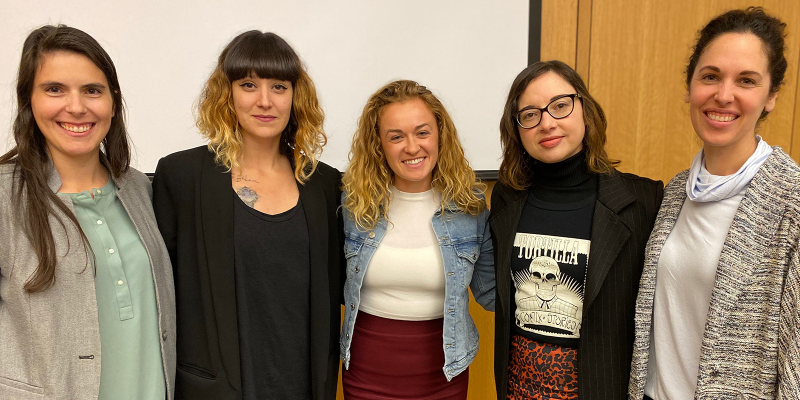
Alan Kung is a senior at The Ohio State University working towards a major in finance and a minor in history.
For the Moving Subjects Week, I attended the talk on The Travels of Día de los Muertos Observances. During this event, various speakers presented their experiences with The Day of the Dead celebrations as well as exploring topics relating to The Day of the Dead. One of these speakers shared her experience volunteering with the humanitarian group, No More Deaths. This group operates in the deserts of southwest Arizona, which is a key hub where migrants coming from Mexico must cross in order to complete their journey to America. The deserts of southern Arizona are sparsely populated with an inhospitable climate as well. This combination has led to many migrant deaths in the area. Therefore, No More Deaths seeks to help tackle this issue by hiding necessities, such as bottles of water, in areas like these. The reason why No More Deaths must hide these necessities is because they have found that these supplies were routinely destroyed by American border agents. Legislation has also been passed which banned leaving trash around, such as the water left by No More Deaths, under the penalty of imprisonment in areas such as the deserts of southwest Arizona. One can argue that this legislation was specifically targeted toward humanitarian groups like NMD since, as was stated earlier, these areas are not densely populated and do not have a littering problem. I have heard about the situation in migrant detention centers but, I have not heard of anything like this until this talk. It shocks me as an American to see our government take blatant steps to ensure that the corridors, in which migrants traverse to make it to America, are made to be more treacherous to deter further immigration into the United States.
Originally from Grove City, Ohio, Ean Teague is a graduating senior at The Ohio State University, majoring in history.
During Moving Subjects Week, I attended “The Travels of Día de los Muertos Observances,” which shed a spotlight on the adaptation and implementation of Latin American influence on our society. Particularly, I enjoyed the section discussing the evolution of the All Souls Procession in Tucson, Arizona. Originating as a homegrown method of grieving, the event began incorporating elements of Día de los Muertos imagery and traditions, such that the present-day version is a large blend of cultures. Among the most interesting bits about this festival is that, while it shares elements with that of Día de los Muertos, it has evolved into what was referred to at the event as an “invented ritual” and a “celebration of community,” a fascinating example of the evolution of cultural blending near geopolitical borders.
Beyond the border, the event also discussed the concept of “placemaking,” which was stated to be the concept of “transforming a space into a place” by creating a sense of belonging in that space. This need to belong is at the pinnacle of the problems facing our worldwide migrant crises. Via procession, the example given being a Día procession down the sidewalks of High Street, there is a coalescence of culture and an assertion that meaning and belonging to the onlookers, that the space means something, that the walkers have the right to be there as human beings, without regard to arbitrary qualifiers. From my point of view, I would enjoy seeing more of this in society, for without this assertion, I feel that we cannot generate the acceptance of belonging. Though I know that not all onlookers would approve, it is time for the realization that the forging of a combined culture is happening now, and it has been happening—it is not merely popping out of the woodwork.
